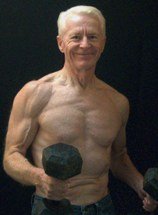| Back to Back Issues Page |
 |
|
The Gray Iron Fitness Newsletter, Issue #168 Are burpees safe for seniors? August 15, 2015 |
Hi
August 15, 2015
In this newsletter . . . Beloved BurpeesYour exercise prime objective
Beloved BurpeesAthletes may dread and say they hate them, but secretly it's love and admiration. The question is: Are Burpees (aka squat thrusts) okay for seniors?They ask because they know they're highly regarded as a body-weight-only, full-body exercise. They also know they can leave you huffing and puffing like a steam engine. And that’s fine if you’re in top-notch condition. It's not so smart, however, if you are way out-of-shape or suffer from certain medical conditions. I have a short video and Burpee explanation. Please take a look. At the beginner level, Burpees can be good overall, low-intensity, full-body movements. Most seniors, at any level, can do them at the beginner level. Speed them up to the intermediate or advanced level and you can really challenge and develop overall fitness. So to the question: Are Burpees okay (meaning safe) for seniors? It just depends on how you approach them, based on your age and fitness level. Use sound judgment. If you're an out-of-shape beginner, ease into them gradually and with low intensity. Watch the video here. If you like the newsletter, we're making it easy to share it . . . Your exercise prime objectiveThe prime objective of senior exercise programs should be to stay as fit as possible for as long as possible. It’s as simple as that. But think about it for a moment, and ask yourself if your training reflects that value.Here’s what I mean: In Living the Fitness Lifestyle there is a section called “A Question of Priorities.” In a short quiz, I ask the reader to be completely honest and, in the order of their importance, rate the following:
I’m willing to bet that, on average, the younger the trainee, the greater will be the importance given to bench pressing and biceps size. If you are a young senior, say in your 50s, and you honestly give your blood pressure and cholesterol readings higher priority, congratulations. As they say, “You’ve got your head screwed on straight.” If, on the other hand, you haven’t got a clue as to what those readings are, please schedule an appointment with your doctor and find out. Ignoring them is no laughing matter. I hope no one reading this gets the impression that I’m opposed to working out for the purpose of building more muscle. They’d be very wrong. I’ve been there, and it’s rewarding and fun. It is the quest that gets us into the weight room in the first place. However, as the years add up most of us adjust our priorities. Or at least we should. As we gradually move through the young-senior stage and approach the upper end of our senior years, our concerns and focus should shift more to strength and health maintenance, rather than trying to build the biggest biceps nature allows. Eventually, such issues as balance and concerns about losing one’s independence come to the forefront. As that time approaches, the regularity and structure of an exercise program is still as important to our well-being as ever, maybe even more so. At the same time, all out efforts to lift as much weight as possible, or taking extraordinary measures (using steroids, for example) to build more muscle mass may be tempting, but a serious mistake. It is at this time that the preservation of lean muscle mass and strength should be at the forefront in our regular trips to the weight room. If you haven’t read Weight Training Builds Senior Muscle, it’s a short summary of why resistance training is so important. And the reason for its importance isn’t the comparatively superficial desire for bulging biceps and bench press personal records. There is a right time and place for everything. And, referring back the first paragraph, the prime objective of senior exercise programs should be to stay as fit as possible for as long as possible. Intelligent, balanced amounts of resistance training, cardiovascular exercise and flexibility movements are the formula for success. For mature adults, Bob Hoffman’s admonishment to “Train don’t strain” becomes more valid than ever.

Newsletter Policy The Gray Iron Fitness Newsletter is a free publication sent twice monthly to subscribers. The purpose is to provide honest and realistic fitness information for people age 50 and above. I have never been paid or received compensation of any kind to write a positive review or endorse a product. If I say that I personally use a product or service, it is because I find value in it and have paid for it with my own money. Like newspapers, magazines and television, this newsletter and my web site contain advertising and marketing links. Naturally, I am compensated for these. The newsletter and web site provide information to help users establish and maintain a fitness lifestyle. But fitness information is not the same as fitness advice, which is the application of exercise and dietary practices to an individual's specific circumstances. Therefore, always consult with your physician for assurance that fitness information, and your interpretation of it, is appropriate for you. Your comments and questions are always appreciated. Simply click on the "Reply" bottom. |
| Back to Back Issues Page |